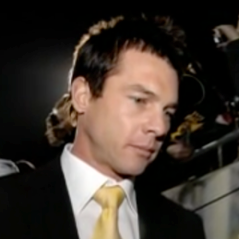Hero, zero, hero again: The road to redemption an easy path for AFL stars
They're surrounded by scandal, so why do we keep forgiving them? Mojonews.com.au sport editor LACHLAN CASSIDY looks at two AFL stars who have gone from hero to zero, and back again.

By LACHLAN CASSIDY

By LACHLAN CASSIDY
AFL stars facing allegations of domestic violence or drug abuse are finding an easy ride to redemption, a leading Australian researcher says.
Macquarie University’s Dr Deb Watson – who investigates media coverage on off-field indiscretions of sports stars – said when Ben Cousins was arrested on three occasions in March it was “written-off as ‘boys will be boys’. ”
“With Cousins this time around, it was the nature of the arrests – refusing a breath test and breaking into army barracks, even taking drugs,” she said.
“If it wasn’t Ben Cousins, it wouldn’t have been in the news.
“Changing the celebrity culture of AFL is a virtually impossible task, but I think if clubs and the league should take a stand and impose penalties on offending players, this could have a huge impact.”
Cousins faced Fremantle Magistrates’ Court last week on charges of leading police on a low-speed car chase, failing to stop and failing to agree to a breath test. Cousins is on bail until his next appearance in court in late June.
He was also released on bail when he appeared in Armadale Magistrates’ Court the day before on charges of trespass and damaging property.
In both cases, his lawyer has made submissions that the charges be discontinued. Cousins has also had a mental health assessment.
Dr Watson said while Australia battled rising rates of domestic violence and endemic drug abuse, leniency sent a dangerous message.

“When sporting heroes are easily forgiven for crimes or indiscretions, then that sends a message that these things are okay, or at least not all that bad,” she said.
Cousins’ AFL career began explosively, winning the Rising Star Award in 1996, and his on-field brilliance saw him to the West Coast captaincy, a Brownlow Medal in 2005 and All-Australian selection six times.
But in 2007, the Eagles sacked Cousins and the AFL imposed a one-year ban for “bringing the game into disrepute” after he was arrested for drug possession and refusing a police blood test.
Cousins’ AFL career began explosively, winning the Rising Star Award in 1996, and his on-field brilliance saw him to the West Coast captaincy, a Brownlow Medal in 2005 and All-Australian selection six times.

But in 2007, the Eagles sacked Cousins and the AFL imposed a one-year ban for “bringing the game into disrepute” after he was arrested for drug possession and refusing a police blood test.
Just two years later, fans hailed his return to Richmond. The Round 1 clash drew more than 86,972 people to the MCG, more than 14, 000 up on the previous year.
He started worked on a documentary that aired in 2010, detailing his drug use and party antics. He said he hoped his story would help to save lives. It was one of the most widely watched programs on Australian TV that year.
Dr Watson, author of the book Athletes, Sexual Assault and ‘Trials by Media': Narrative Immunity, said media outlets often found trivial angles when covering crimes committed by AFL players because they didn’t want to offend fans.
“For most fans, hearing that their hero has been accused of a crime is like hearing it about your brother or your best friend,” she said.
“You assume that it isn’t true, and that someone’s either made a mistake or is out to get them. You choose to think of the good, and ignore the bad.”
Fans also forgave North Melbourne footy star Wayne Carey when he had an extramarital affair and faced allegations of domestic violence.

While Carey now has two children and is a successful columnist at The Age, and a commentator at Channel 7 and Triple M Melbourne, Dr Watson said the media paved his path to redemption.
“Part of the reason it was so easy for a lot of people to forgive [Carey] is because well-constructed redemption narratives are powerful, and this is something the media can take some responsibility for,” she said.
Football reporter legend Mike Sheahan recently named Carey the best player in the past 25 years, while he was immortalised in 2010 with his induction into the AFL Hall of Fame.
But the scandal of an affair with Kelli Stevens in 2002 – then the wife of Kangaroo vice-captain Anthony Stevens – saw Carey resign in disgrace after teammates refused to speak to him.
He was later criticised for leaving his pregnant wife for model Kate Nielson, who later alleged he assaulted her.

Dr Watson said the media prevented victims from finding justice when it trivialised allegations against AFL players.
“This is particularly concerning with things like domestic violence and sexual violence, which are already widely considered to be unimportant, or the victims’ fault,” she said.
While fans still refer to Carey as “The King” and he’s widely regarded as the greatest player of all time.
The Cousins documentary is on YouTube.





